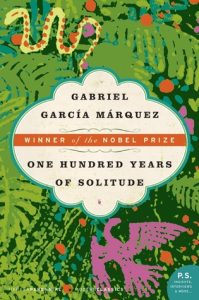 I don’t even remember the original reason I added One Hundred Years of Solitude to my to-read list, whence I heard or read the title, but I get the feeling it’s one of those novels that everyone has sort of heard about in passing if not already read. It might help that García Márquez was a Nobel Prize winner. I almost get the feeling that even just mentioning the title gets you a sort of look from a certain crowd. Kind of like casually mentioning that you read Proust, or love Dostoevsky*, I think. Anyway, I finally read it sometime last year and the moment I finished it, I wanted to return to the beginning once more and traverse those one hundred years all over again from page one. Alas, there was a hold.
I don’t even remember the original reason I added One Hundred Years of Solitude to my to-read list, whence I heard or read the title, but I get the feeling it’s one of those novels that everyone has sort of heard about in passing if not already read. It might help that García Márquez was a Nobel Prize winner. I almost get the feeling that even just mentioning the title gets you a sort of look from a certain crowd. Kind of like casually mentioning that you read Proust, or love Dostoevsky*, I think. Anyway, I finally read it sometime last year and the moment I finished it, I wanted to return to the beginning once more and traverse those one hundred years all over again from page one. Alas, there was a hold.
I’m not sure how to describe this beautiful novel other than that it is a world unto itself, like a drawstring bag that encloses the universe and lets only sands of it out as you read the tale. And every time I recall its cover I think of a verdant snowglobe, an entire universe about to implode upon itself then settle into a meditative state of non-being, rather than recalling the open collage of forest elements that actually constitutes the cover. My interpretation of the book of course influences my memory of the cover, just as surely as my judging of each book’s cover influences my reading of the book itself, and it’s precisely this impression that García Márquez’s** writing invokes – I suppose that’s what the genre “magical realism” refers to. How do I even begin to describe the novel? How do I describe the plot? How to tell you if you haven’t already read it, don’t already understand the sort of spell I’ve been put under by One Hundred Years of Solitude? Well I suppose I better try, now that I’ve started.
The tale follows the Buendía family, but I don’t know if that’s what I should be telling you. I want to talk rather about the style of writing, how there’s magic imbued in everyday life and how these occurrences are treated as, if not mundane, then nothing in particular to be frightened of. By all accounts, there is a lack of logic in how things happen, and yet – and yet. You’re drawn into the impossibility of the silly premise that the child born of a union between cousins should have the tail of a pig, in a world where this could actually happen, because this is a reality where mustard plasters prevent pregnancy and girls can be so beautiful as to drive all those who gaze upon her mad. Premonitions and fortunes told carry so much more weight for the inhabitants of García Márquez’s world than they might for most of ours outside of his pages, and the only way I can describe it is as though we were to float through an ocean of fog, the only thing keeping us afloat our willing suspension of disbelief – no, there’s something stronger in the air: it must be magic.
*Who doesn’t? Though perhaps Proust sounds a bit more highbrow than Dostoevsky. I’m not too well versed in this snobbish hierarchy of author name-dropping. More on snobbery in Snobbery by Joseph Epstein.
**Would it be García Márquez’s or García Márquez’?
Because I enjoyed One Hundred Years of Solitude so much, I decided to go through and start reading the rest of what we own of García Márquez’s novels in English translation. (There has never been a time when I had wished more fervently that I had paid more attention in that one Spanish class I took back in the summer of grade 2! If only I knew I’d want to read them in the original!) I’ve only just recently finished Of Love and Other Demons, and I’m becoming increasingly interested in what cultural influences must have played their part in the writing of these beautiful tales, steeped as they are in references to folk magic, rituals, and race as a marker of social class.
Anyway, if you’re looking to immerse yourself into another world, one that operates on a slightly different axis than ours, in which folk magic, ritual, and coincidences play a very real part – though also one which you wouldn’t really call fantasy – García Márquez is your ticket into a world you won’t forget.
It’s on my list now! I’ve definitely heard of it, like you said. Lovely post by the way! I was sold in paragraph one.
It’s absolutely beautiful – I hope you like it!